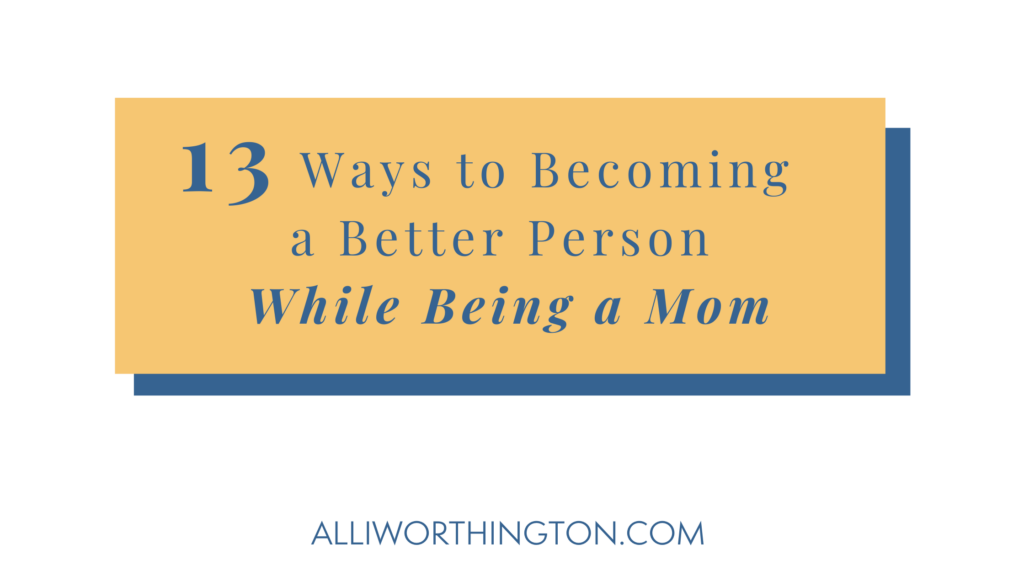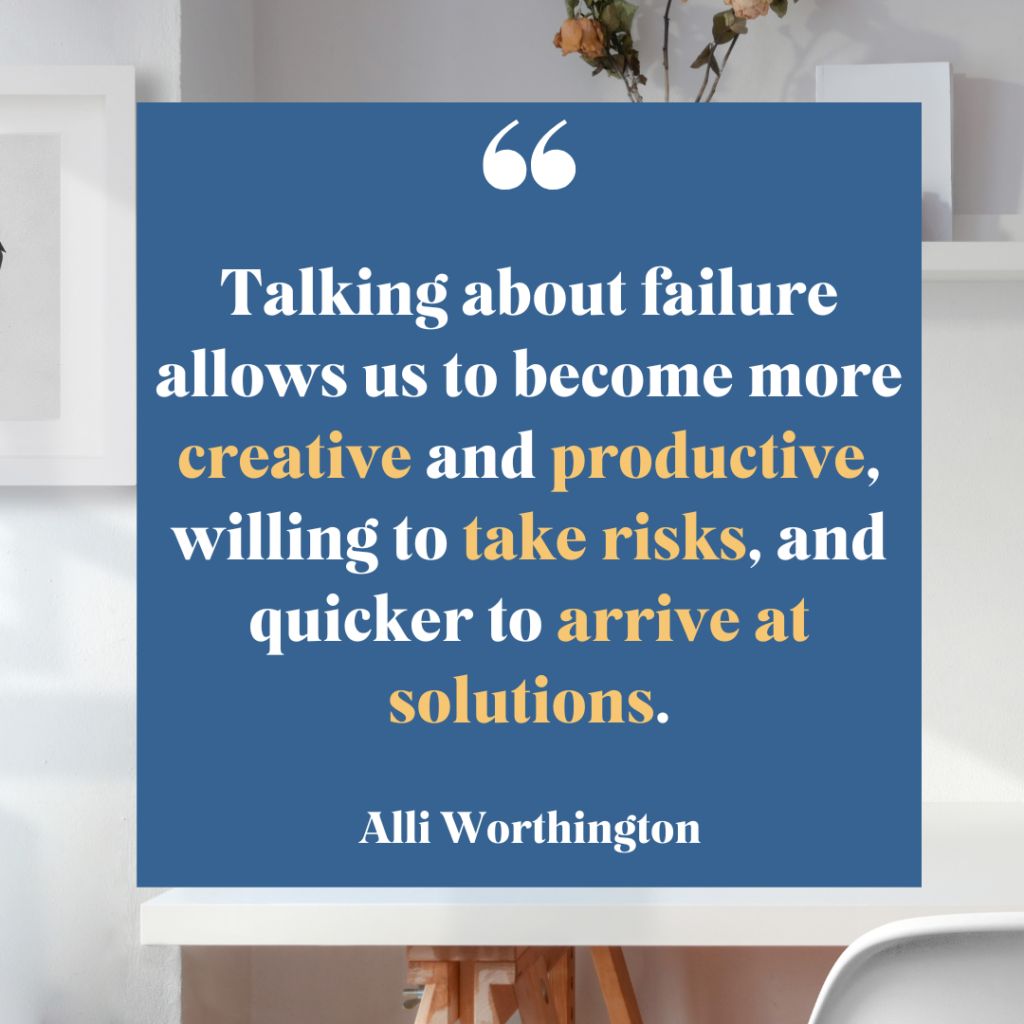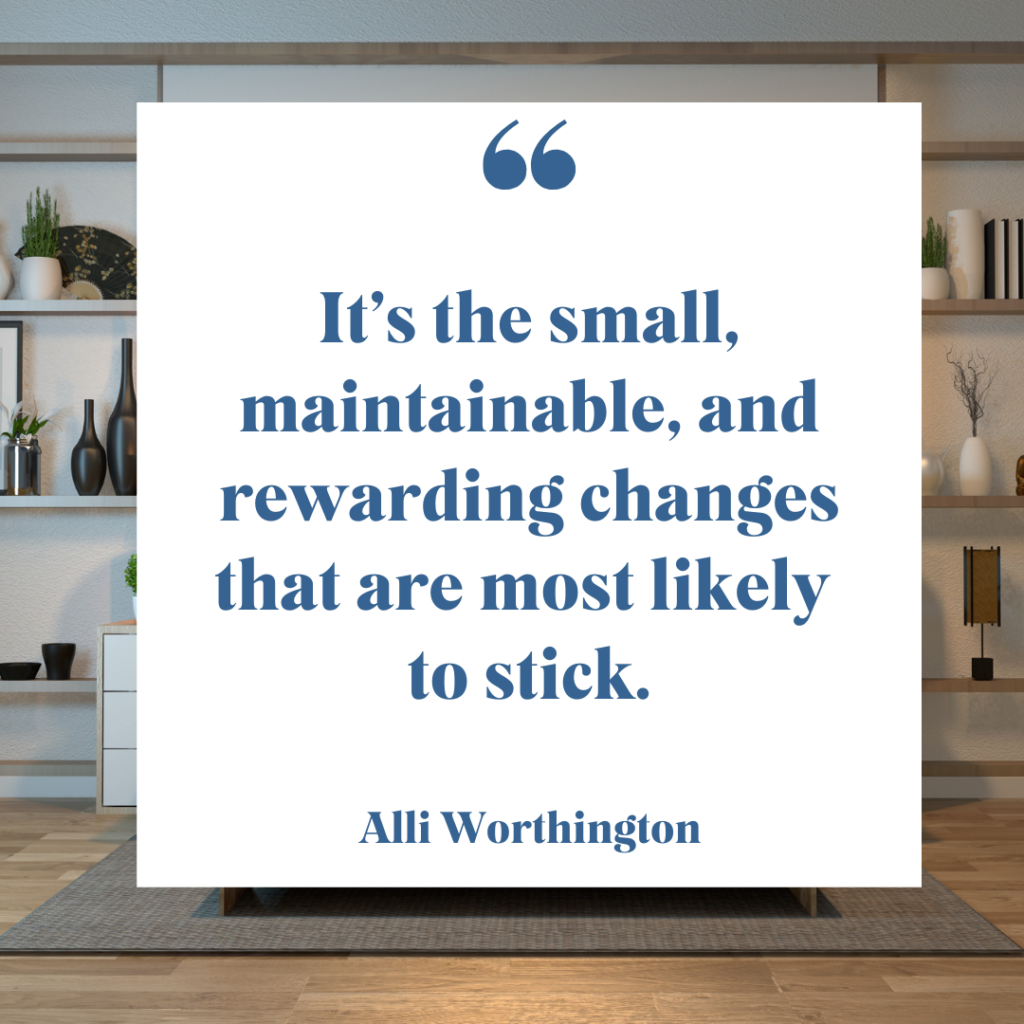You know building your brand is a crucial step to crafting your dream business. This workbook is designed with you in mind to simplify those steps.
Internship Application
13 Ways to Become a Better Person While Being a Mom

The best gift we can give our families is caring for ourselves—becoming whole, healthy, and happy women. Our children will pick up on what we’re feeling, so we need to be intentional about filling ourselves in the midst of caring for them.
While growing as a person can be difficult for everyone, moms face extra challenges as they care for tiny humans in addition to pursuing their own growth. Because our children will model our behavior, we want to ensure we’re setting the best example we can.
Personal growth is important because we are imperfect humans trying to live fulfilling lives while making the world a better place. And we can only offer others the messages and beliefs we’re feeding ourselves. So let’s make those messages helpful!
Here are 13 ideas for personal growth in the busy season of motherhood.
1. Direct Your Schedule Instead of Letting It Direct You
If we want to meet our personal growth goals, then we need to make sure we have the time to invest in ourselves. This means that we need to take ownership of our schedule.
I want to introduce the idea of proactive vs. reactive time management. A reactive change is one we make after a crisis hits—typically when something has already gone wrong. But a proactive approach means we’re making changes in advance, well before our schedule gets out of hand.
A proactive approach can take practice before it feels natural, especially if your schedule has been directing you for a long time. But the resilience and determination you cultivate in taking charge of your schedule will be invaluable in the long run!
Proactive time management means we’re setting boundaries on our time by saying no to some things so we can invest more of our limited time in the things that are most important to us.
Action Step: Prioritize What Matters
Spend some time writing out the things that are most important to you. That might be prioritizing family dinners, attending your kids’ sporting events, investing in your business, or going to counseling. Make sure you include time and activities for yourself, too! This list is unique to you, and you should put it somewhere you see it often.
Then, as you get requests from others, check to see how the tasks or projects align with your priorities and if you have room to add something into your schedule without burning out (rest is important too!).
It’s a good practice to take time to think before responding to a new request or demand. Simply say, “Let me check my schedule and get back to you.” Then pause, take a breath, and ask yourself if you have the time and capacity to honor your priorities while also saying yes to the new request.
If you’re not sure, ask yourself if the new request can wait. The answer is almost always yes.
Look at that, you’re now directing your schedule!

2. Create Consistency in Your Calendar
Now that you have your priorities listed, it’s time to shape your calendar to set yourself up for growth.
Carey Nieuwhof says that in addition to managing our time, we also need to manage our energy. This is because not all 24 hours of the day are created equal, and we each have different times for peak productivity and relaxation.
Nieuwhof recommends dividing the day into green, yellow, and red zones. We only have about 3–5 peak hours of productivity—the green zone. Those are the hours you want to reserve for working towards your personal growth goals and producing important content.
The red zone is the 1–2 hours when you’re dragging, desperate for another cup of coffee or tea. These hours are best for mindless activities like checking email or running errands with your kids. You might not work at all in your red zone, and that’s okay.
The yellow zone is in-between. You can pursue your goals, but it’s also not your best work. Maybe use this time to read books, schedule content to post, or to listen to a podcast while doing tasks around the house.
Action Step: Find Your Zones
The hours for your green, yellow, and red zones will be different from mine and from your friends. So experiment with your schedule until you find a routine that maximizes your productive time. Block these times out on your calendar. Don’t forget to add blocks for family activities too!
Now when you get requests or demands from others, you can look at your red and yellow zones to see if there’s space to say yes. Whether you say yes or no to requests, I hope you feel confident that your calendar is more aligned with your personal growth goals.
3. One In, One Out Rule
Identifying the areas in your life that aren’t producing fruit is a great way to break busy and make proactive changes. What you say no to determines what you say yes to.
The One In, One Out Rule is most commonly followed by minimalists who regularly declutter their space. For every new item they bring into their home, they must get rid of another item—maintaining an equilibrium of sorts.
But it’s also a rule we can apply to our daily activities. For every yes you say, find another responsibility you can remove from your plate.
If you’ve chosen to pursue growth in the midst of mom life, you’ll need to monitor how many new activities you choose to chase. If you take on too many new activities at once, you may feel more defeated than encouraged.
Once defeat begins to set in and you start associating it with that activity, you’ll be less interested in working on it in the future, regardless of how important that skill might be. Avoid defeat.
When you use the One In, One Out Rule to direct your focus, you’ll enjoy a more holistic process of self-growth. You’ll also benefit from more introspection, which will help you in the long run.

4. Outsource What You Can
One of my favorite tips for moms and business owners alike is to outsource whatever you can. I tell business owners that when they have more money than time, they should outsource the tasks that drain them.
The same is true for us as moms! We have limited time, and it’s hard to invest in ourselves and our families if we’re spending all our precious hours on mundane tasks that aren’t moving us toward our goals.
Action Step: Think About Outsourcing
Consider hiring a college student to watch your kids during your green zone hours in the summer. Then you can still be attentive to them the rest of the day while also feeling good about the time you invested in your own personal growth.
Try having your groceries delivered, or at least picking them up curbside. This saves you time spent shopping and the potential chaos of wrangling your tiny army through the store. You can use those salvaged hours to make memories with your kids or work on your goals.
5. Cultivate Soft Skills
You might not have the capacity to start a side hustle or work for an organization, but there are still lots of valuable skills you can cultivate in yourself in this season of motherhood.
The concept of soft skills is nothing new. However, this concept has grown in popularity in recent years with good reason. Forbes reports that as more job activities become automated, soft skills—which machines can’t replicate—have become more critical. Traits that qualify as soft skills are:
- Time management
- A positive attitude
- Flexibility
- Empathy
- Curiosity
- Resilience
- Relationship building
- Self-reliance
If you’re looking for personal growth in a busy season, challenge yourself to cultivate these soft skills within the work and responsibilities you currently have.

6. Examine What May Be Hindering You
A hindrance holds you back, slows you down, and keeps you from living the life you were created to live. Obstacles come in many forms: bitterness, unforgiveness, bad company, or self-sabotage, to name a few.
What’s holding you back from achieving your personal growth goals as a mom? Is it the Instagram-fueled “shoulds” of motherhood? Unhelpful life advice from your own mom or other women who don’t yet have kids? Self-imposed expectations? Resentment?
Action Step: Intentionally Reflect
Begin to slow down, journal consistently, and invite others to offer perspective about their opinion as to what could be holding you back from growth. It will take an open heart and a little work, but this process will significantly strengthen your outlook.
7. Find a Mentor
If there’s a woman in your life who you look up to, then you should reach out to her! We become like the people we’re around, so we might as well be intentional about the women speaking wisdom into our lives.
In addition to mentoring, invest in things like podcasts, books, and counseling. These resources are like mentors from afar that can speak into your life and offer tips on growing as a person no matter what stage of motherhood you’re in.
8. Invest in Good Community—Your Mom Tribe
Find the people who think like you and relentlessly support you in all your endeavors. These are the ladies who will see you at your worst and love you anyway.
The best moms never go it alone. All throughout history, we see that moms raised their kids in community. It’s good to take turns with carpool duty. We need people who get what we’re going through and who can both commiserate in the bad times and celebrate the good times of mom life.
When we have a mom tribe cheering us on, we’re more likely to take risks in our self-growth because we know that we’re supported and loved regardless of the outcome.
9. Have Other Identities
Early in our relationship, my husband encouraged me to cultivate a passion other than motherhood. I’m so grateful he did.
Let’s be real: your kids won’t be in the house forever, and you’ll need something to plug yourself into as they grow up and demand less of your time. I don’t want you to feel purposeless at any point, especially once all your kids have left home.
Cultivate other identities that bring you hope, joy, or purpose. I’m a business coach because I want to see other women succeed in bringing their passions to the world. Maybe you also want to be a coach—perhaps for career, nutrition, fitness, relationships, or life. If so, I can help you build a coaching business in The Coach School.
Or maybe your identity lies more with volunteering at church or community engagement. Spend time plugging into those communities. It can be tricky not to let volunteer activities take over your life, which is why it’s important to direct your schedule like we practiced earlier.
Remember that you are more than any single identity or event. You’re a beautiful, complex mama, and that’s worth celebrating and cultivating. When you invest in your other identities, you’ll see personal growth, and so will your family!

10. Don’t be Afraid to Fail
This is a scary one, so hear me out. Failure is a part of life, and we can’t grow if we don’t experience challenges, however small, that we have to overcome.
I practice the idea of failing fast. This means that you quickly assess what happened and learn from your failure so you don’t make the same mistake again.
But you know what else is great? When you fail quickly and are open about your challenges, then your kids will also see failure as a valuable part of life.
In the work world, when organizations are open to conversations about failure, employees are more creative, more willing to take risks, more productive, and quicker to arrive at solutions than in cultures that are secretive about struggles or failure.
The same is true for personal life! If we are willing to talk about failures, then those around us will also feel less pressure to have their act together. And then we can all work towards personal improvement with a little less stress about performing for those around us.
11. Start Small
In Atomic Habits, James Clear suggests that the key to building a new habit is starting small. He offers an example of a man who went to the gym for 5 minutes every day. That’s it! He walked in, set a timer for 5 minutes of exercise, and then walked out. After a while, he slowly started staying longer because he grew to like the habit.
Action Step: Practice New Habits
Think about a new habit you want to add into your daily life. Maybe it’s reading or meditating. Great! Set a timer for 2 minutes every day for at least a week. 2 minutes is easy to find. Even if you read as you’re falling asleep, 2 minutes will not eat into precious rest time.
There are other ways to stack habits or make them easier to practice. Some ideas:
- Carry a book with you so you can read it in the school pick-up line
- Practice locking your phone in a drawer for 15 minutes every day
- Meditate for 3 minutes before eating lunch
And then, after two weeks of practicing your chosen small habit, assess your feelings towards it and decide if you want to gradually extend the time you devote to the habit. Maybe you were sad when the timer would go off. That’s a sign that you should invest in this habit more!
You might also consider getting your family involved in your new habit. Maybe everyone spends 15 minutes without technology while playing a board game or reads for five minutes after dinner. When you make it fun for your kids, the entire family start adopting personal growth practices.
The key is to start small with a fun habit because it’s the tinyl, maintainable, and rewarding changes that are most likely to stick.

12. Rest & Make Time For Yourself
We’ve all heard that we can’t pour from an empty cup. But as a mom, it might feel like all you’re doing is pouring without much time to refill your internal reservoir.
I’m giving you permission to take time for yourself—return your mother’s call, go to brunch with your Mom Tribe, or take a nap. When you rest, you’ll find that you’re more energized and able to focus on your family and personal improvement projects.
If you struggle with difficulty remembering things, it’s most likely connected to a lack of sleep. The Sleep Foundation reports that memory consolidation—which is essential to personal growth—occurs throughout the sleep cycle, including both non-REM and REM stages.
Conversely, insufficient sleep can impair your memory. Sleep helps stimulate creativity and improve concentration, so when you’re feeling sluggish, consider taking a short power nap instead of chugging another cup of coffee.

13. Drop the Mom Guilt and Give Yourself Grace
The most important thing I want you to remember is that there’s no such thing as a perfect mom; there are only imperfect moms doing the best they can to love and serve their families while also attending to their own self-growth.
Here’s the hard truth: you won’t get it all right, and it will take time to implement these 13 practices in a sustainable way that works for you and your family. So give yourself grace!
Mom guilt is pervasive in this Instagram-driven world, and it’s easy to get sucked into a rabbit hole of comparison and self-shame. Put yourself in timeout if you need to. Unfollow the accounts that make you feel the worst about yourself as a mom or as someone who wants to pursue different goals or other identities.
Be open to talking about mom guilt, too. You’ll feel a lot freer as you release the pressures of perfectionism and performance, and you might even find solidarity with other women who want to live whole, fulfilling lives.
Putting It All Together
Proactively making changes can be one of the most powerful tools to break the cycle of busyness in our lives. Finding the best yes in a world of endless options requires us to take stock of the things in our lives that constantly have us in motion.
Slowing down and making conscientious decisions about what to edit out of our lives will allow us to live with more intentionality and continue to grow in the midst of a busy schedule.
Over time, these practices will also give you more room to pursue self-care, self-development, and help you invest in your relationships. Continue pursuing growth. You’re doing great!
Your Action Step
Are you looking for a place to direct your focus as you pursue personal growth? Take the Mom Superpower Quiz to figure out your unique gifts and strengths so you can invest your energy in the best way for you!
